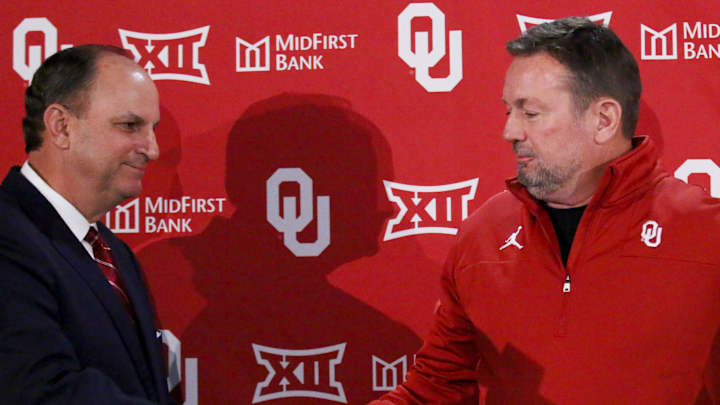Oklahoma AD Expounds on Why Lincoln Riley Left for USC

NORMAN — So why did Lincoln Riley really leave Oklahoma?
The world may never know.
Riley was introduced as USC’s new head coach on Monday in Los Angeles, half a continent and about 28 hours away from where the earth shook on Sunday.
Riley, a precocious 38 years old and sitting in the blue blood lap of luxury at Oklahoma, decided he wanted out after just five years.
He’s the first coach to leave OU for another job since Chuck Fairbanks in 1973, and the first to leave OU for another college job since Jim Tatum in 1946.
OU athletic director Joe Castiglione and president Joe Harroz said at a press conference Monday at Memorial Stadium that they and the Sooner team were blindsided by Sunday’s news.
“Obviously, you wish these events wouldn't happen,” Harroz said. “And the way we would like them to play out don’t play into the individual’s thinking. He made a personal decision and he had to approach it. Were we disappointed? Absolutely. And that disappointment lasts until you realize you've got to move forward.
“Yeah, we would have liked more notice. We were surprised by it yesterday. That was his decision.”
Was Riley, as the fan base has widely surmised, scared off by Oklahoma’s decision to join the Southeastern Conference? Castiglione said no.
“We talked about that with him,” Castiglione said. “He was engaged in our thoughts about it, and he was definitely on board with it and any conversation since the announcement was made; continued to be on board with it.
“Let me be absolutely crystal clear. We knew it. It was a collective effort on everything around that. And we’re going into it clear light. We were and are engaged in a comprehensive review of our program, where we are, how we compare, what’s going on in other SEC — all, the entire conference. We’re doing our own due diligence to create a really comprehensive transition plan.”
Speculation has centered on Riley’s displeasure with OU’s relative inaction on NIL opportunities for student-athletes being a hindrance in recruiting, especially with the SEC specter looming. There’s also been talk of Riley asking for more staffers, more resources for recruiting and more salary for assistant coaches.
Castiglione was asked if Riley expressed to him any concerns or unrest about the OU program.
“There wasn't any mention of any unrest,” Castiglione said. “We were talking about all the positives of the job and where we are now and what we were planning to do moving forward, which we are going to continue to do. That's the bottom line.”
Although no tangible dollar figures have been floated publicly, it seems highly unlikely that Riley took the USC job for a financial security. Cost of living in Southern California (an estimated 120-160 percent increase over Norman) and high state income tax (12.3 percent compared to Oklahoma’s 5 percent) suggest Riley could nearly double his salary and expect the same standard of living.
So Riley’s not afraid of the SEC. He’s not mad at OU administration. And he’s not swimming in excess cash.
So why?
“When he talked to President Harroz and I, he said that he was intrigued by a different kind of opportunity,” Castiglione said. “He was absolutely happy with everything that we had talked about — infrastructure, support, resources, facilities, all the things that we constantly talked about when coach Stoops was here.
“We're always in the mode of constantly improving. All of that was, in his words, absolutely great. He just got very intrigued with a different and unique opportunity that he felt was best for him and his family. There wasn't any mention of any unrest. We were talking about all the positives of the job and where we are now and what we were planning to do moving forward, which we are going to continue to do. That's the bottom line.”

John is an award-winning journalist whose work spans five decades in Oklahoma, with multiple state, regional and national awards as a sportswriter at various newspapers. During his newspaper career, John covered the Dallas Cowboys, the Kansas City Chiefs, the Oklahoma Sooners, the Oklahoma State Cowboys, the Arkansas Razorbacks and much more. In 2016, John changed careers, migrating into radio and launching a YouTube channel, and has built a successful independent media company, DanCam Media. From there, John has written under the banners of Sporting News, Sports Illustrated, Fan Nation and a handful of local and national magazines while hosting daily sports talk radio shows in Oklahoma City, Tulsa and statewide. John has also spoken on Capitol Hill in Oklahoma City in a successful effort to put more certified athletic trainers in Oklahoma public high schools. Among the dozens of awards he has won, John most cherishes his national "Beat Writer of the Year" from the Associated Press Sports Editors, Oklahoma's "Best Sports Column" from the Society of Professional Journalists, and Two "Excellence in Sports Medicine Reporting" Awards from the National Athletic Trainers Association. John holds a bachelor's degree in Mass Communications from East Central University in Ada, OK. Born and raised in North Pole, Alaska, John played football and wrote for the school paper at Ada High School in Ada, OK. He enjoys books, movies and travel, and lives in Broken Arrow, OK, with his wife and two kids.
Follow johnehoover